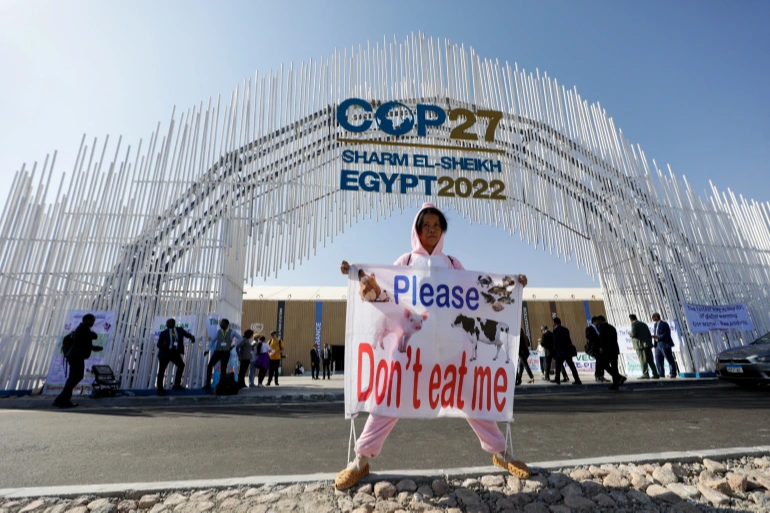
An activist holds a banner, as she demonstrates at the entrance of the Sharm El Sheikh International Convention Centre, during the COP27 climate summit opening, in Sharm el-Sheikh, Egypt, November 7, 2022
Cairo, November 9 (RHC)-- Developing and emerging countries excluding China need investments well beyond $2 trillion annually by 2030 if the world is to stop the global warming juggernaut and cope with its effects, according to a United Nations-backed report.
A trillion dollars should come from rich countries, investors and multilateral development banks, said the analysis commissioned by Britain and Egypt, hosts respectively of the 2021 UN climate summit in Glasgow and this week’s COP27 event in Sharm el-Sheikh.
“The world needs a breakthrough and a new roadmap on climate finance that can mobilise the $1 trillion in external finance that will be needed by 2030 for emerging markets and developing countries (EMDC) other than China,” the report said.
The new 100-page analysis, Finance for Climate Action, is presented as an investment blueprint for greening the global economy quickly enough to meet Paris climate treaty goals of capping the rise in global temperatures below two degrees Celsius, and at 1.5C, if possible. Warming beyond that threshold, scientists warn, could push Earth towards an unliveable hothouse state.
The report is among the first to map out the investment needed across the three broad areas covered in UN climate talks: reduction of the greenhouse gas emissions that drive warming (mitigation), adapting to future climate effects (adaptation), and compensating poor and vulnerable nations for unavoidable damages already incurred, known as “loss and damage.”
One of the report leads Vera Songwe said “unlocking substantial climate finance was key” to solving development challenges today. “This means countries must have access to affordable, sustainable low-cost financing from the multilateral development banks to help crowd in investments from the private sector and philanthropy to support the energy transformation, build resilience and protect natural capital,” she said in a press release. “Financing alone is not enough and must be coupled with the right instruments and good policies to accelerate and scale up impact.”
The report calls for grants and low-interest loans from the governments of developed countries to double from about $30 billion annually today to $60bn by 2025. “These sources of finance are critical for emerging markets and developing countries to support action on restoring land and nature, and for protecting against and responding to the loss and damage due to climate change impacts,” the authors said.
“Emerging market” countries include large economies in the Global South that have seen rapid growth – coupled with rising greenhouse gas emissions – in recent decades, including India, Brazil, South Africa, Indonesia and Vietnam.
Historically seen as part of this group, China was excluded from the new estimates, presumably because of its unique and hybrid status. Its economy – the second largest in the world – is in many respects advanced, and Beijing has positioned itself as a major international investor in its own right, through its Belt and Road Initiative and the promotion of “South-South” investment across the developing world.
In the context of climate change, developing nations include the world’s poorest economies, many of them in Africa, and those most vulnerable to climate hazards, such as small island states facing existential threats from sea-level rise and ever more powerful cyclones.
“Most of the growth in energy infrastructure and consumption projected to occur over the next decade will be in emerging market and developing countries,” said the other co-lead of the report, Nicholas Stern. “If they lock in dependence on fossil fuels and emissions, the world will not be able to avoid dangerous climate change, damaging and destroying billions of lives and livelihoods in both rich and poor countries,” he added.

